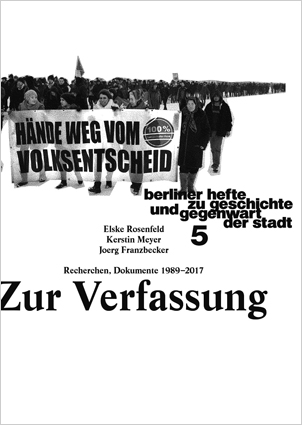In 1990, a constitution with wide-ranging civil rights was in effect in East Berlin for half a year. These civil rights had been formulated by the citizens’ movements and the opposition at the Central Round Table of the GDR, based on the experiences of the 1989 revolution. In the first parliament of the reunited Berlin, efforts to anchor these expanded political rights in the new constitution were largely defeated. However, a provision for legislation by the people was adopted. As a result, in the state of Berlin laws can be passed directly without the parliament by popular vote. In recent years, two laws have been passed in this way: the public disclosure of municipal water contracts and the preservation of the Tempelhofer Feld. Although a majority of Berliners—in all districts—voted in favor of the latter in May 2014, the governing parties soon tried to overturn this legislation passed by the citizens. In response, a new citizens’ legislative proposal, Volksentscheid Retten, was initiated in 2016 to strengthen legislation by popular vote in the constitution. These two processes, in 1989/90 and 2016, aimed to enable all Berliners to participate in shaping the constitution. This book traces the connection between the two.
Produced in the context of Ene Mene Muh und welche Stadt willst Du? Contributions to the Berlin state election 2016, nGbK, 2016/17
German, 96 pages, with an images series by Elske Rosenfeld
1990 galt in Ost-Berlin für ein halbes Jahr eine Verfassung, die weitreichende politische Bürgerrechte enthielt. Diese waren aus den Erfahrungen der Revolution 1989 von den Bürgerbewegungen und der Opposition am Zentralen Runden Tisch der DDR formuliert worden. Die Verankerung der erweiterten politischen Rechte in der gemeinsamen Landesverfassung scheiterte jedoch im ersten Gesamtberliner Abgeordnetenhaus – einzig die Volksgesetzgebung wurde übernommen. Damit ist es in Berlin möglich, Gesetze durch Volksentscheid und ohne das Parlament direkt zu beschließen. Das gelang bisher mit den Volksentscheiden zur Offenlegung der Wasserverträge und zum Erhalt des Tempelhofer Feldes. Für letzteren stimmte im Mai 2014 eine Mehrheit in allen Bezirken. Dennoch versuchten die Regierungsparteien, das Tempelhofer Feld-Gesetz wieder zu kippen. In Reaktion darauf wurde 2016 das Volksbegehren Volksentscheid Retten eingeleitet, um die Volksgesetzgebung in der Verfassung zu stärken. Beide Vorgänge, 1989/90 und 2016, hatten zum Ziel, dass alle Berliner*innen an der Ausgestaltung der Verfassung teilhaben können. Sie bilden die Klammer für dieses Heft.
Produziert anlässlich des Projektes Ene Mene Muh und welche Stadt willst Du? Beiträge zum Berliner Wahlherbst 2016, nGbK, 2016/17
Deutsch, 96 Seiten, mit einer Bildstrecke von Elske Rosenfeld
Recherchematerial: http://berlinerhefte.de/archiv/
Bestellen:
Print: November 2017, Deutsch, ISBN 978-3-946674-04-7, 7,00 € .Onlinebestellung
ePub, PDF: September 2018, Deutsch, ISBN 978-3-947295-06-7 (ePub), ISBN 978-3-947295-12-8 (PDF), 3,99 € .Onlinebestellung
